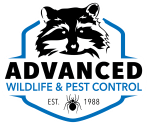There are various diseases that are carried by wild animals that can cause harm to humans or their four-legged companions. We will be highlighting some of the most serious, common, or notorious diseases that fall into this category in a series of blog posts. Today we will be taking a closer look at histoplasmosis.
Histoplasmosis is a fungal infection that can be contracted by humans. It is caused by spores of the fungus Histoplasma. This fungus is found in soil, particularly soil that has been contaminated by bat or bird droppings. When these spores become airborne they can easily be breathed in unknowingly, as they are not visible to the naked eye. Once breathed in these spores can transform into a yeast, which can then attack various parts of the body. Clean up or demolition projects, where droppings or soil containing droppings are stirred up, is when the risk of inhalation is highest.
While the infection can be contracted by humans, most humans will be unaware that they have been infected. Many of those who are exposed to the spores will never develop symptoms. It can take almost three weeks for symptoms to develop after exposure. The infection presents itself with flu-like symptoms such as fever, chills, headache, muscle aches, fatigue, and a cough. Chest pain or discomfort, joint pain, or a rash can develop in some individuals. In healthy individuals, these symptoms will likely go away in two weeks to a month, without the need for medication. However, those with pre-existing lung disease may run the risk of more serious symptoms, such as weight loss and coughing blood. Typically, it is only young children, seniors, and those with compromised immune systems who are truly at risk, as this infection can attack any system within the body and, if left untreated, may result in death. Courses of antifungal medications are available for those who do require medication for treatment.
Histoplasmosis is not contagious, so those who are infected or might have been exposed do not need to worry about transmitting the disease to others. However, family companions such as cats and dogs can contract the disease if they are also exposed to the spores. Both cats and dogs will often present with the same symptoms as humans if symptoms are to occur. This disease most commonly occurs in the Midwest, particularly around the Mississippi and Ohio Rivers. Cases of this infection in Wisconsin are fairly uncommon but not unheard of. As such, it is important to hire a professional team to provide clean up services in areas that have a high content of bat or bird droppings before doing construction, landscaping, or renovation work.


